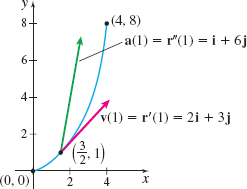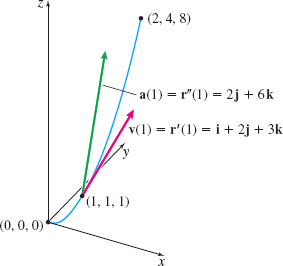EXAMPLE 1Finding Velocity, Acceleration, and Speed
Find the velocity v, acceleration a, and speed v of a particle that is moving along:
(a) the plane curve r(t)=(12t2+t)i+t3j from t=0 to t=2.
(b) the space curve r(t)=ti+t2j+t3k from t=0 to t=2.
For each curve, graph the motion of the particle and the vectors v(1) and a(1).

Solution (a) The velocity, acceleration, and speed are v(t)=r′(t)=ddt(12t2+t)i+ddtt3j=(t+1)i+3t2ja(t)=r′′(t)=ddtr′(t)=ddt(t+1)i+ddt3t2j=i+6tjv(t)=‖
At t=1, the velocity is \mathbf{v}(1)=\mathbf{r}^{\prime} (1)=2\mathbf{i}+3\mathbf{j} and the acceleration is \mathbf{a}(1)=\mathbf{r}^{\prime \prime}(1)=\mathbf{i}+6\mathbf{j}. Figure 25 illustrates the graph of \mathbf{r}=\mathbf{r}( t), \mathbf{v}(1), and \mathbf{a}(1).
786
(b) The velocity, acceleration, and speed of the particle are \begin{eqnarray*} \mathbf{v}(t)&\;=\;&\mathbf{r}^{\prime} (t)=\dfrac{d}{dt}t\mathbf{i}+\dfrac{d}{dt} t^{2}\mathbf{j}+\dfrac{d}{dt}t^{3}\mathbf{k}=\mathbf{i}+2t\mathbf{j}+3t^{2} \mathbf{k} \\[12pt] \mathbf{a}(t)&\;=\;&\mathbf{r}^{\prime \prime} (t)=\dfrac{d}{dt}\mathbf{r^{\prime} } ( t)\;=\;\dfrac{d}{dt}\mathbf{i}+\dfrac{d}{dt}( 2t) \mathbf{j}+\dfrac{d}{dt}( 3t^{2}) \mathbf{k}=2\mathbf{j}+6t \mathbf{k} \\[12pt] v(t)&\;=\;&\left\Vert \mathbf{v}(t)\right\Vert\;=\;\sqrt{1^{2}+( 2t) ^{2}+( 3t^{2}) ^{2}}=\sqrt{1+4t^{2}+9t^{4}} \end{eqnarray*}

At t=1, the velocity is \mathbf{v}(1)=\mathbf{i}+2\mathbf{j}+3\mathbf{k} and the acceleration is \mathbf{a}(1)=2\mathbf{j}+6\mathbf{k}. See Figure 26.